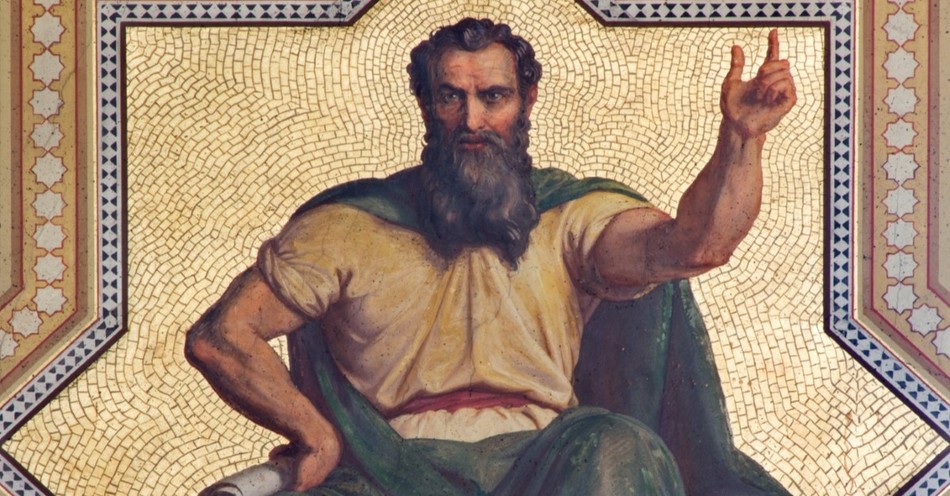Joel is a prophet in the Bible, best known for his book "The Book of Joel," which is part of the collection of minor prophets in the Old Testament. Joel's prophecies focus on themes of repentance and the promise of restoration and divine blessing for God's people if they return to Him. His writings also include vivid descriptions of natural disasters, which he interprets as signs of God's impending judgment and a call to repentance.
Additionally, Joel prophesies the outpouring of God's Spirit in the last days, a passage notably referenced by the Apostle Peter in his sermon at Pentecost in the New Testament. The exact dates and context of Joel's ministry are not clearly specified, making it one of the more ambiguously dated books in the Bible.
When you’re looking for a good biblical name for a child or grandchild, there are a few to steer clear of (like Nimrod or Abimelech). But many others, including Jared, David, Daniel, and Joel, often make the list. But who is Joel, and what was important about him to be a name in the Bible?
The Book of Joel
Joel was a prophet in the Old Testament, recognized for his book "The Book of Joel," which is categorized among the minor prophets, not due to lesser importance but because of the book's shorter length. The timeframe of Joel's prophecies is debated but is often placed around 835-800 BC. Joel's messages are poetic and rich in imagery, frequently using a locust plague that devastated Judah as a metaphor for divine judgment against the nation's sins.
Joel's book is distinct for its strong themes concerning the Day of the Lord, a time of divine judgment and wrath, and potential restoration if the people repent. A key element in Joel's prophecy is the promise of the outpouring of God's Spirit on all people, a passage famously cited by the Apostle Peter during Pentecost in the New Testament (Acts 2). This prophecy underscores a future where God's spirit empowers various groups of people to prophesy and have visions.
Where is Joel in the Bible?
The name Joel is mentioned in eleven places in the scriptures (1 Sam. 8:2; 1 Chron. 4:35; 5:4; 7:3; 11:38; 15:7; 26:22; 27:20; 2 Chron. 29:12; Ezra 10:43; Neh. 11:9). The most referred to is the prophet Joel found in the book of Joel.
The book of Joel is one of the twelve minor prophetic books in the Old Testament. Much of the book of Joel is focused on the sovereignty and governorship of God and the need for Judah to repent and turn their hearts to the Lord.
Joel 1 and Joel 2 were found among the Dead Sea Scrolls in fragments 4Q78 and 4Q82. The book of Joel contains several prophecies and warnings to the people of the divided kingdom of Judah.
One of the prophesies is the “outpouring of the Holy Spirit,” which Peter quoted on the Feast of Pentecost in Acts 2:16-21. Dr. Thomas L. Constable favors this interpretation, but “other interpreters see a double or partial fulfillment on the day of Pentecost with the church and a future fulfillment with Israel in the Millennium.”
What Is Joel’s Role in Israel’s History?
The only details mentioned in Joel are that he is the son of Pethuel (a name not mentioned anywhere else in Scripture), a reference to Judah recovering from a plague of locusts, and mention of Philistines, Phoenicians, Egypt, and Edom as enemies. This doesn’t give us the specific context to say which king of Judah was reigning at the time of Joel’s message.
Scholars differ on when Joel fits into the biblical timeline.
Zondervan’s Illustrated Bible Dictionary lists the following possibilities:
- The ninth century BC, during Joash’s reign, which would make Joel one of the earliest Old Testament prophets. This possibility is supported by the Assyrian and Babylonian Empires not being referenced in Joel’s writings.
- 630-587 BC, in the last decade of the Kingdom of Judah
- 520-500 BC, before the return of the Exiles and the writings of Zechariah and Haggai.
- Around 400 BC, during the Persian Period, which would make Joel one of the latest writings of the Minor Prophets.
- Bible commentator Richard Patterson suggests Joel was written in the eighth century during King Uzziah’s reign, placing Joel before Hosea, Amos, and Jonah.
Despite the ambiguity of when the book of Joel was written, its message is timeless. Contributing writer Joel Ryan states that the book of Joel “challenges the people to take seriously God’s call to repentance to avoid an even greater spiritual disaster in the form of God’s inevitable judgment.”
What Does Joel Teach Us about Lament?
One of the main themes of Joel is a call to repent and lament. But what does it mean to lament? The general definition of lament is to grieve and mourn, but isn’t that the same as repenting?
To repent is to turn away from sin and turn back to God. But lamenting our sin calls us to recognize and change, for our hearts to be broken and grieved by our sin.
It’s like when my kids get into trouble. They can say they are sorry for their bad behavior and make a change not to repeat it. But to have a deep, heartfelt recognition of the damage done in the situation is entirely different. Joel is calling the people of Judah to do that in his writings.
It’s one thing to say you grieve and repent, but even Joel knows that men and women are good at performing. Joel calls for the people to not only tear their garments, which was a sign of mourning and grief but to “rend your hearts, not your garments” (Joel 2:13).
Leslie C. Allen’s Minor prophet commentary says, “Laments in the OT are sometimes followed by a divine oracle in which Yahweh, through a prophet, assures his people that their prayers will be answered (or sometimes rejected).”
The same is true in Joel. Much of the first half of the book of Joel is to look at the devastation around them because of the locusts (maybe literal locusts, maybe an enemy army) and let the people of Judah be reminded of their need for God.
Joel Ryan’s Crosswalk article on what we can learn from Joel states that “Joel shares how God often uses nature and events like famine, plague, violent weather, invading armies, and celestial phenomena to get our attention (Joel 1:5). Sometimes it works; sometimes it doesn’t. Desperation and national or even personal disaster or economic depression can either turn our hearts and focus back to God and His ways, or blind us from the truth and lead us further into despair.”
What Does Joel Teach Us about Hope?
Despite Judah’s hopelessness at the time of Joel’s writings, an element of hope is woven within its words. Much of the second half of Joel speaks about how the land will be refreshed. That God will “restore to you the years that the swarming locust has eaten” (Joel 2:25), that God will “send you grain and new wine and oil, and you will be satisfied by them” (Joel 2:19).
Not only does Joel speak of the land being restored. He talks about how God will pour out His spirit on all:
“And afterward, I will pour out my Spirit on all people. Your sons and daughters will prophesy, your old men will dream dreams, your young men will see visions.” (Joel 2:28)
What hope would that have brought to the people of Judah? For in the time of Joel, only prophets and kings were given the Holy Spirit, but Joel speaks of a time when all the faith will have the Holy Spirit or God with them.
This prophecy was partly fulfilled on the day of Pentecost when the Holy Spirit comes down for all believers (Acts 2:16-21). But also a prophecy for the complete fulfillment of God’s rescue plan to return us to Eden. Not just in our hearts but in a new heaven and new earth we are told about in Revelation.
Joel also speaks of justice being given to the enemies of Israel. All the oppression Judah faced from Tyre and Sidon, and Philistia, will be avenged, and the people of Judah restored to their father’s land. For those who heard Joel’s words at the time of his writings, there is hope for future glory. We also have hope in the future glory of the Lord when he “is to judge the living and the dead, and by his appearing and his kingdom” (2 Timothy 4:1).
Like many of the Psalms and other biblical poetry, Joel turns our eyes back to the one whom all hope comes from, God. Joel reminds us that despite hopelessness and despair, God is still working to restore his people. Both the people of Israel and those “to be adopted as his sons through Jesus Christ, by this pleasure and will” (Ephesians 1:5).
Photo Credit: Getty Images/sedmak

You can find out more about Valerie, her books, and her blog at www.valeriefentress.com.
This article is part of our People of Christianity catalog that features the stories, meaning, and significance of well-known people from the Bible and history. Here are some of the most popular articles for knowing important figures in Christianity:
How Did the Apostle Paul Die?
Who are the Nicolaitans in Revelation?
Who Was Deborah in the Bible?
Who Was Moses in the Bible?
King Solomon's Story in the Bible
Who Was Lot's Wife in the Bible?
Who Was Jezebel in the Bible?
Who Was the Prodigal Son?


.jpg)
